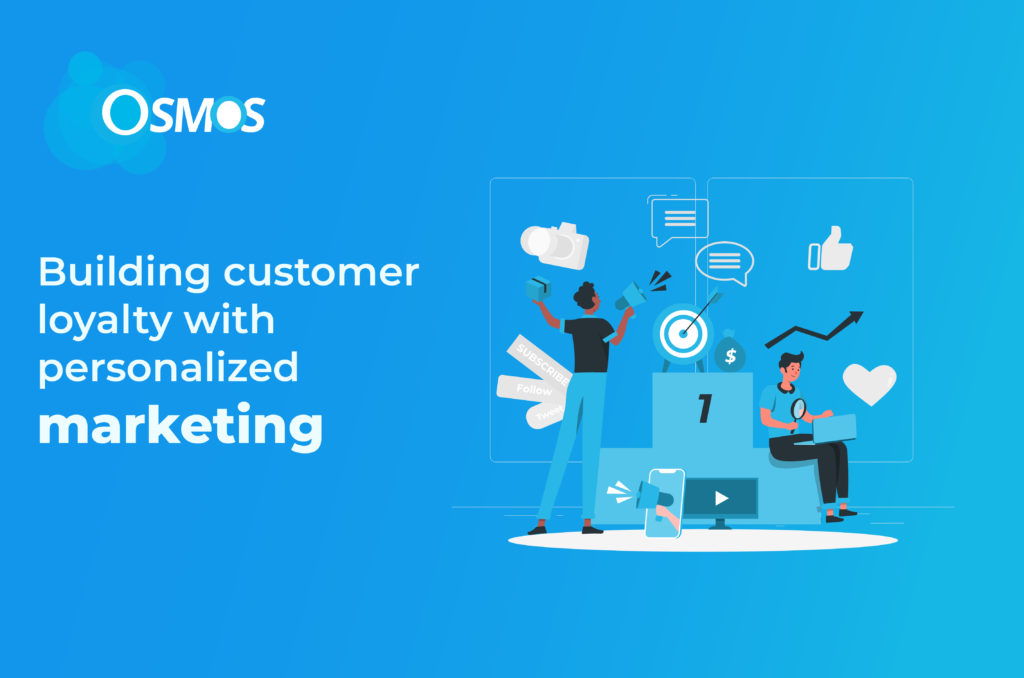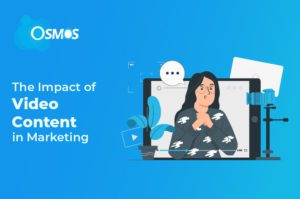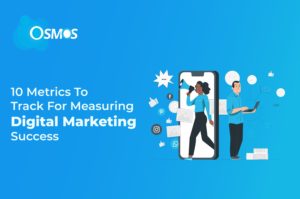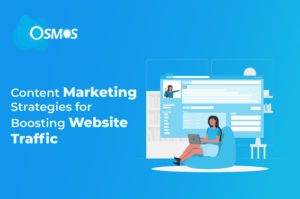Discover how to create and implement personalized marketing campaigns that can help you build customer loyalty. Learn more about the power of targeted messaging, segmenting your audience, and understanding your customers’ behavior!
Personalized marketing is a secret that can help businesses create a loyal customer base. It’s all about connecting with customers on an individual level and tailoring specialized messages.
When you understand what makes your customers happy and show that you genuinely care, you build a stronger bond.
With personalized marketing, you’re not just sending generic messages into the internet space but you are creating content that resonates with your customers, making them feel special and important.
They’ll return for more when they see that you’re paying attention and catering to their interests.
Personalized marketing isn’t just about warm and fuzzy feelings. It’s also a goldmine of valuable data. This data can help you get insight into a customer’s mind, learn their behaviors and preferences.
With this knowledge, you can develop killer strategies and create content that hits the bullseye.
Connection between Personalized Marketing and Customer Loyalty

When you personalize your marketing efforts, you take your relationship with customers to the next level. With personalized marketing, they become familiar with your brand, and familiarity breeds loyalty.
They’ll choose you over your competitors since you’ve shown them that you truly understand their needs and wants.
Personalized marketing is a deeper level of engagement that helps foster brand awareness and build customer loyalty. Customers becoming more familiar with a brand will likely become loyal and continue purchasing from the same company.
Personalized marketing also helps create a better experience for customers as they receive offers that reflect their needs.
Personalized marketing is an excellent way for businesses to build relationships with existing customers and also attract new ones.
By providing personalized content and offers tailored to each customer’s needs, businesses can create a memorable shopping experience.
7 Benefits of Implementing Personalized Marketing
Personalized marketing is like sprinkling some fairy dust on your customer experience. It’s a delightful journey where customers receive offers and discounts that are tailor-made for them.
Now, let’s talk about the incredible benefits of implementing personalized marketing:
1. Increased conversions
By leveraging customer-specific data, companies can create custom experiences that are more likely to drive conversions. By delivering messages that hit the right notes at the right time, you’ll convince the target audience to take action.
Personalized marketing can be used in many ways, from personalized emails and display ads to targeted messaging and location-based promotions.
Each channel offers unique opportunities for companies to tailor their messages and increase conversions.
2. Competitive advantage
Personalized marketing can give companies an edge over competitors in a competitive market. It serves as a secret weapon in the battle for customer supremacy. By offering tailored content, services, and experiences, you’ll stand out from the crowd.
Personalized marketing strategies also enable companies to collect more accurate data about their customers’ likes and preferences.
This data can be used to make more informed decisions. Additionally, personalizing messages helps to create an emotional connection with customers and reinforces the unique value that a company’s products or services bring.
3. Boosts customer satisfaction
Personalized marketing can involve anything from targeted email campaigns to personalized social media posts and ads. Imagine customers receiving personalized emails, tailored social media posts, and ads that make them say, “Wow, they understand me!”
By serving up content that matches their interests, you’ll keep them happy and coming back for more.
With personalized marketing, businesses can build stronger relationships with their customers. This helps create a more positive customer experience and encourages them to repeating customers.
4. Increased customer lifetime values
Customer Lifetime Value (CLV) refers to a metric which indicates the total profit a business can make from a customer throughout the entirety of a relationship. Implementing personalized marketing can help you boost CLV as their spending will soar.
Moreover, using data analytics to understand customer behavior and preferences can enable companies to develop more personalized product offerings and services that better meet customer needs.
5. Improved targeting
With personalized marketing, you hit the bull’s-eye every time. You’ll become a sharpshooter, aiming your messages at the right people at the right time. It’s like shooting arrows of relevance straight into their hearts. With improved targeting, your customers will be captivated, and your conversion rates will hit the roof.
By tailoring marketing messages and offers to customers’ needs, businesses can create more engaging experiences. Personalization also allows businesses to show that they understand their customers’ desires, making them feel seen and appreciated.
6. Increased retention
Whenever a customer receives content that speaks to them, they are hooked. Personalized emails, special offers, and a sprinkle of appreciation will keep them returning.
When customers feel like they are being valued and respected, they are more likely to stick to your business. Personalizing customer experiences, such as through personalized emails or special offers, show customers that their relationship with a business is valued and appreciated.
7. Enhanced communication
Personalized marketing can help a business enhance customer communication and boost customer experience. With tailored messages, businesses can engage with their customers in a better way.
This helps create a deeper connection beyond generic messaging and allows businesses to understand the needs of their customers better.
Personalized marketing also allows businesses to build relationships with customers in a meaningful way. This creates an engaging experience for the customer, which can help build trust and loyalty over time.
5 Steps to Implement Personalization in Marketing

Now that we’ve covered the benefits let’s go through some steps to implement personalized marketing. Below are the five essential steps you need to follow:
1. Data Collection
Data collection is one of the first aspects to unlock personalized marketing. By tracking customer trends and analyzing their behavior, you’ll unlock the secrets that lead to personalized marketing success.
It helps create a better customer experience. Furthermore, data collection can also provide insight into how customers interact with different types of messaging and media.
It assists companies in making informed decisions on which channels to use when marketing their products and services.
2. Analyze the data
The second step in personalized marketing is data analytics. It’s putting on your data detective hat and digging deep. Analyzing customer interactions helps you uncover vital data and use it to create a personalized experience for the customer.
Data analysis tools like predictive analytics, machine learning, natural language processing, or sentiment analysis can help businesses in:
- Identifying market trends
- Uncovering customer insights
- Developing data-driven strategies
By leveraging insights from data analytics, companies can create personalized campaigns. It helps in targeting their most valuable customers and increases ROI.
3. Create customer segment
By segmenting your customers into groups based on their preferences and interests, you’ll create personalized campaigns that make them feel special. It’s almost like finding the perfect puzzle piece to complete the picture.
For example, an apparel brand might segment its customers by age, gender, and lifestyle preferences. This can help them create personalized campaigns tailored specifically for each group.
By utilizing customer segmentation, marketers can ensure that their messages are relevant and have the intended impact on each target audience.
4. Develop personalized content
Now, it’s time to wave your content wand and create messages that speak directly to your customers. Personalized content can be used across online and offline channels such as email, website pages, ads, and social media posts.
When creating personalized content, it’s essential to consider the customer’s journey. Ask yourself questions such as “What content do they need at each stage to move them closer to making a purchase?”
Identifying and providing helpful, informative content can help build customer trust and improve their experience.
5. Measure results
For businesses, it is vital to keep an eye out on the results. They need to consistently check their KPI’s to see how their campaigns are performing.
By measuring these KPIs, you will be able to determine which tactics are working and which need improvement. Additionally, you can use this data to optimize your marketing efforts for maximum ROI.
This is the key to a successful personalized marketing strategy, as it allows you to tailor campaigns that are most effective for your audience.
Some Common Mistakes You Need To Avoid
Personalized marketing can effectively target a specific audience and get the most out of your marketing efforts.
Now, let’s talk about the pesky mistakes you need to avoid:
Over-personalization
Remember, personalization is like adding the perfect amount of spice to your dish. Too much, and it becomes overwhelming. So, avoid bombarding your customers with an avalanche of personalized messages. Keep it cool and give them some breathing space.
Otherwise, this could lead to customers being overwhelmed and unsubscribe to your messages. Similarly, if businesses use personalization in a way that does not align with their customer’s expectations, it will hinder their brand reputation.
Lack of data privacy
Privacy protects your customers’ trust. Ensure you have strict measures to safeguard their data and respect their boundaries.
You can include encryption, two-factor authentication, and limiting access to customer data. Additionally, you should ensure your customers know how their data is collected and used and allow them an option to opt-out if they are not comfortable.
Lack of relevancy
Personalization is all about giving customers what they want when they want it. Avoid sending them messages that make them scratch their heads or leave them annoyed. Lack of relevancy can lead to decreased ROI and overall brand damage.
To overcome this, start by segmenting your customer base into smaller, more targeted groups to ensure each message is tailored correctly. Use data points such as customer preferences or past purchases to create a more personalized experience.
Inconsistency
Inconsistency in personalized marketing is also a persisting issue for businesses. It leads to a lack of trust between the customer and the company. Customers expect that when they receive marketing materials, they are tailored specifically to them.
Staying consistent will not only help you get results overtime but also improve customer retention.







